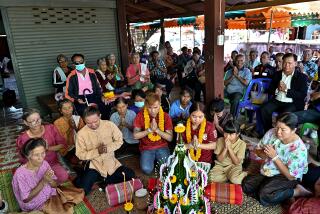Witness Testifies Valley Woman Held Her in Slavery
- Share via
Nobe Saeieo, a 59-year-old illegal immigrant from Thailand, fell on bended knees Tuesday to demonstrate for a federal court jury how she was forced to serve food as an alleged slave to a Woodland Hills woman.
Saeieo was the first prosecution witness in the trial of Supawan Veerapol, who is charged with harboring illegal immigrants, keeping them in involuntary servitude and using their identities to open checking accounts and credit cards that she used for herself.
Supawan’s attorney said the charges against his client are groundless.
As the jurors rose from their seats to watch the demonstration, Saeieo slumped to her knees in front of them and held out her hands as if she were serving a plate of food.
Speaking through an interpreter, she said that Supawan had ordered her to “lower myself down” when serving food to guests from the Thai consulate or other persons of rank.
Supawan, described in a government affidavit as the “common-law wife” of Thailand’s ambassador to Sweden, is accused of using her political connections to the Thai government to obtain passports and visas for a succession of women who entered the United States illegally to work for her.
Federal prosecutors have yet to explain how Supawan was able to secure the visas, which are supposed to be issued by a U.S. consulate.
Saeieo said Supawan recruited her in Thailand in 1989 to come to the United States and work as a $240-a-month cook at Supawan’s restaurant, the Gulf of Siam. She said that she and two other illegal immigrants shared a room at Supawan’s home.
Under questioning by Assistant U.S. Atty. Jack Weiss, she said she worked seven days a week, arising early each morning to scrub floors, wash and iron clothes and, twice a week, wash Supawan’s car.
Midmorning, she said, she was driven to Supawan’s strip-mall restaurant where she worked until closing time late at night.
Though exhausted, Saeieo said she was sometimes forced to work when she got home at late-night dinner parties Supawan threw for friends in the Los Angeles Thai community.
She said she felt “like a slave” during the six years she worked for Supawan.
One time, she said, Supawan learned that Saeieo had asked a Thai monk for help in finding a new job, and told him she feared that “if I leave her, she will kill me and put me on the front page of the newspaper.”
She said Supawan held her passport, censored her mail, and denied her use of a telephone and contact with other people in the Thai community.
In his opening statement to the jury, defense attorney W. Anthony Willoughby called the charges against Supawan “a joke.” He said she is the victim of a conspiracy by a business rival working in league with the Immigration and Naturalization Service agent assigned to the case.
The alleged victims, he said, were free to come and go as they pleased and had keys to Supawan’s house and restaurant.
More to Read
Sign up for Essential California
The most important California stories and recommendations in your inbox every morning.
You may occasionally receive promotional content from the Los Angeles Times.













